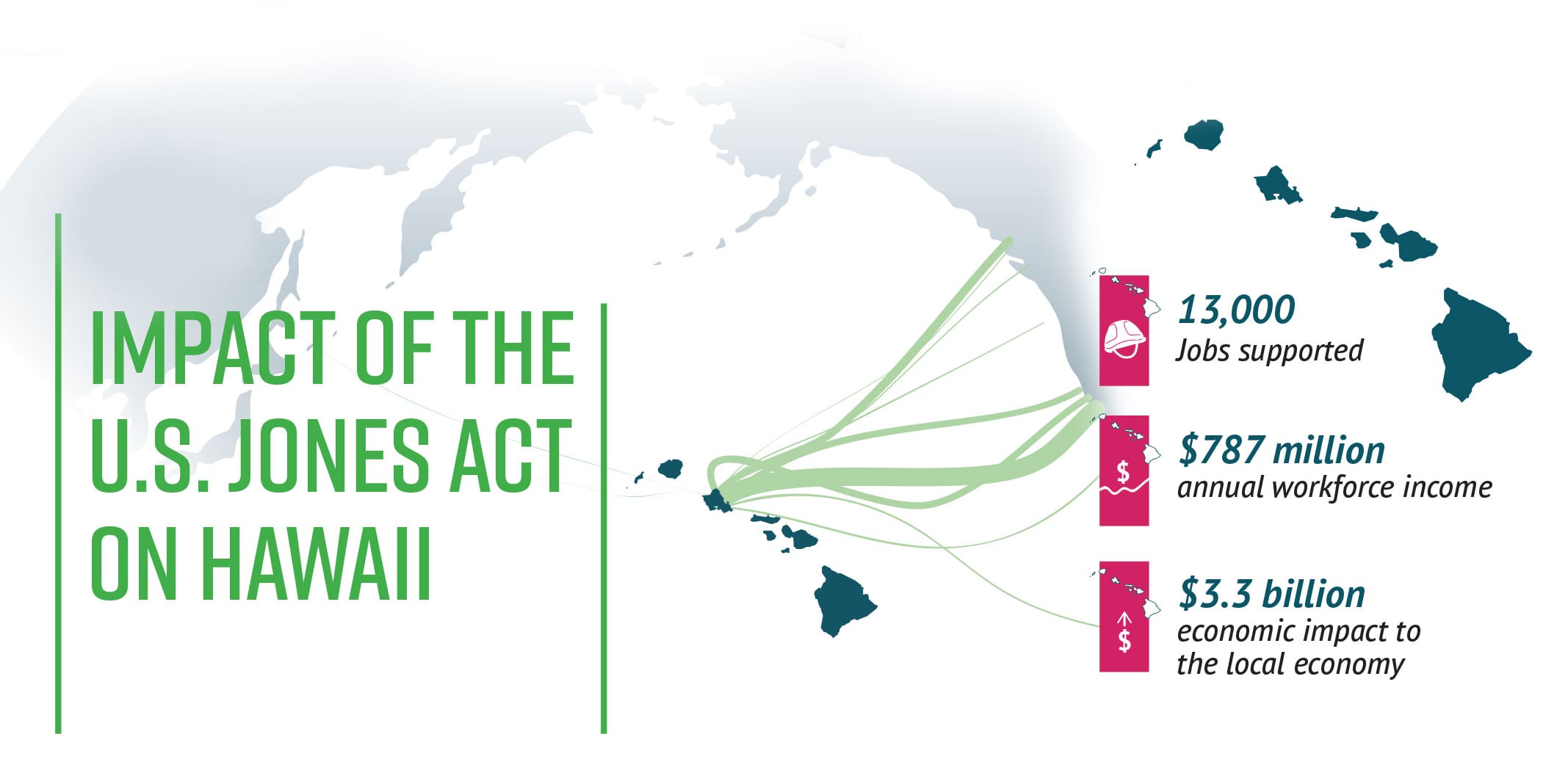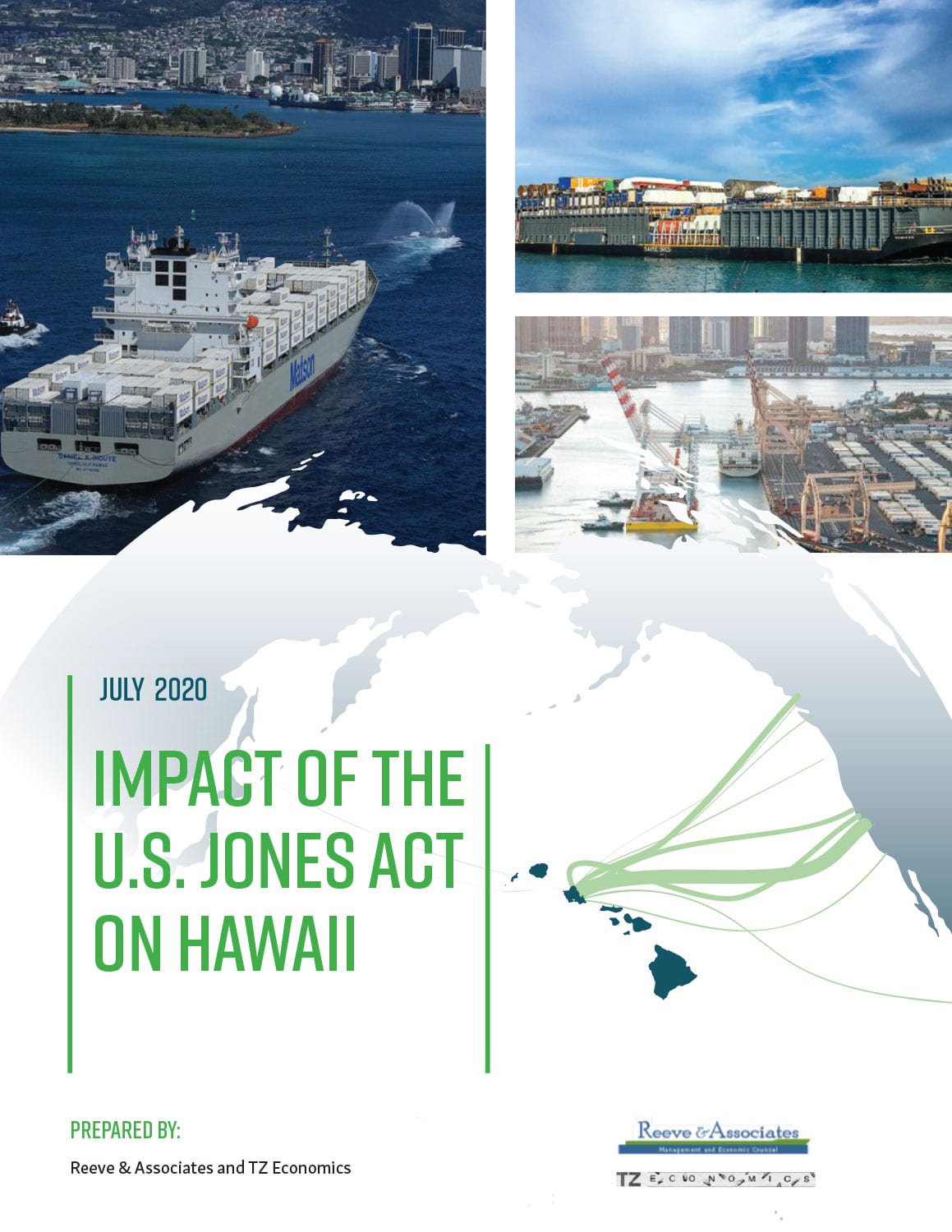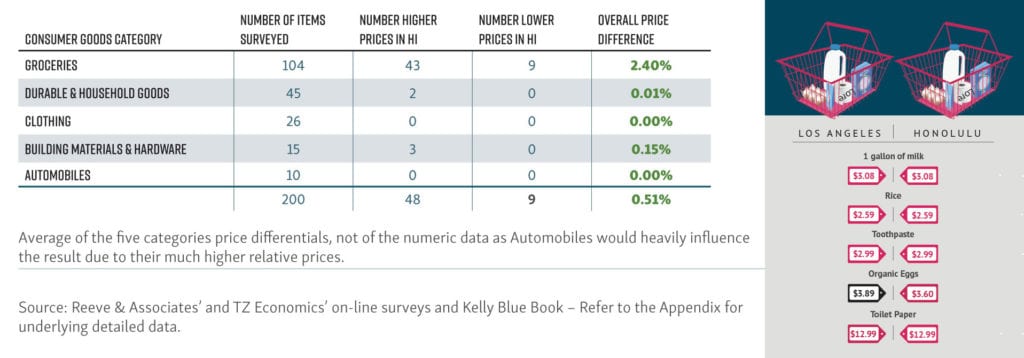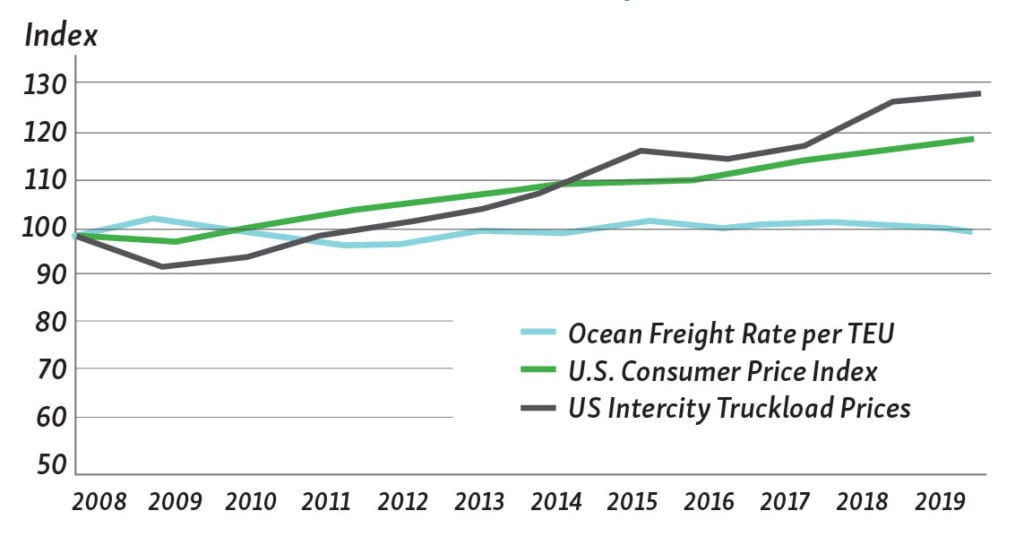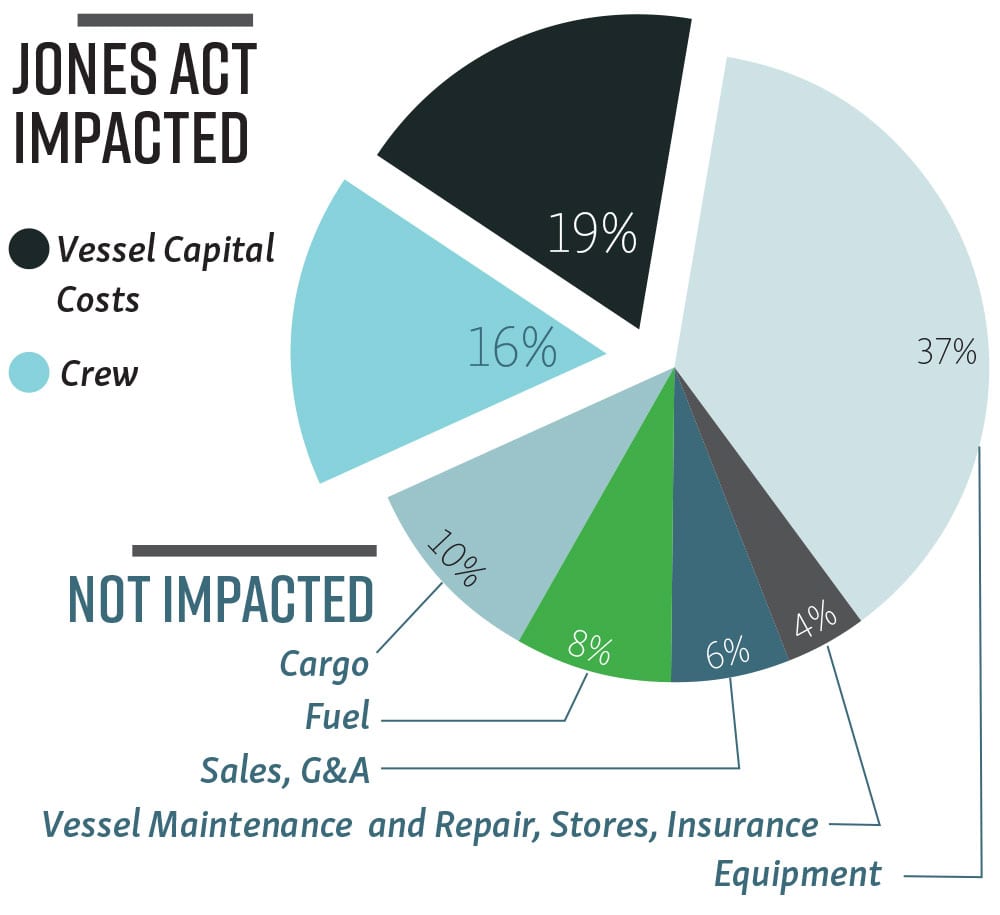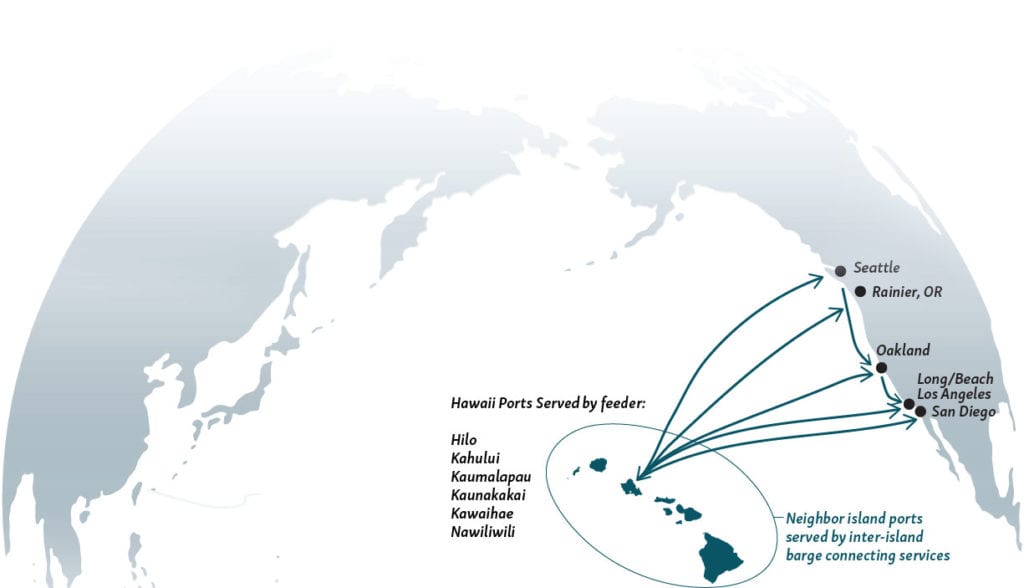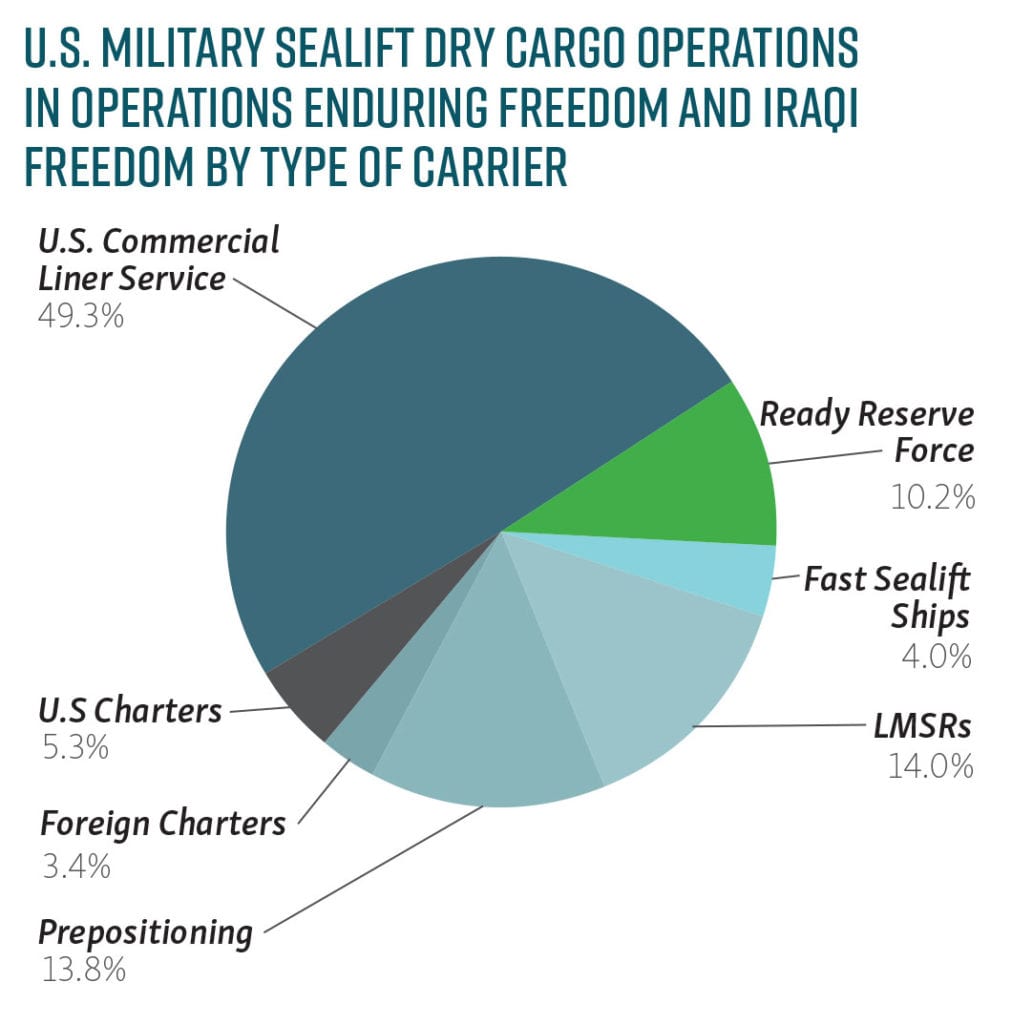The Jones Act is critical to American security and prosperity, delivering over 650,000 U.S. jobs, a reliable supply chain, and protection to our nation’s borders and national security interests. These benefits do not stop within the contiguous United States – and are realized even more in states like Hawaii, 2,500 miles from the U.S. Mainland and home to 13,000 jobs related to the Jones Act shipping industry.
However, some articles have questioned the value of the Jones Act to Hawaii. Their claims of negative impact are not supported by the facts and ignore the examples of the positive role of the Jones Act. In response, Reeve & Associates and TZ Economics produced a fact-based analysis of recent developments in the U.S. Mainland/Hawaii liner shipping market in order to determine how and to what extent shipping services provided in that market impact the people and economy of Hawaii, and, in particular, the cost of living in Hawaii.
Findings demonstrate a negligible impact of Jones Act carriers’ ocean shipping services on the price of goods shipped to Hawaii from the U.S. Mainland, and instead illustrate positive economic contributions, including job creation, new infrastructure investments, and a reliable pipeline for critical consumer and industrial goods moving to and from the Islands.
Importantly, the study shows that freight rates in the Mainland-Hawaii trade declined in real terms over a 10-year period, while benchmarks such as overall U.S. inflation and intercity truckload prices increased substantially (28%) over the same time. In addition, there is more than ample capacity to meet the needs of Hawaii families and businesses. In fact, Jones Act carriers have increased capacity by 22% since 2015 with the addition of new vessels. Click Here to read the full press release.
KNOW THE FACTS
The Jones Act does not impact the cost of living in Hawaii.
A market basket study of 200 consumer goods purchased from major retailers such as Costco, Home Depot, Target and Walmart found no significant difference in the price of consumer goods. 142 out of 200 items (71%) were precisely the same in stores in Hawaii as they were in California. In some cases, retail prices of goods were cheaper in Hawaii.
The study found that while Hawaii does have a high cost of living, that cost is primarily driven by housing expenses and other factors, not the type of consumer goods carried to Hawaii by Jones Act carriers.
Over a ten-year period, Jones Act carriers’ rates have declined in real terms for essential ocean shipping
The study shows that freight rates in the Mainland-Hawaii trade have declined in real terms when considering the cost of inflation, while benchmarks such as intercity truckload prices have increased substantially (28%). This freight rate is despite a 50% increase in wharfage charges for port/terminal improvements.
Moreover, the study found that the trend on ocean freight rates is a clear indicator of strong competition in the Jones Act shipping marketplace.
The large majority of the expenses of moving cargo between the U.S. Mainland and Hawaii are completely unaffected by the Jones Act. If foreign-flag carriers were allowed to operate in the domestic trades, the costs of any foreign-flag vessel would rise substantially due to compliance with other laws, including tax and labor laws.
The study found that only a third of the total costs of a Jones Act carrier moving freight between the Mainland and Hawaii are affected by the Jones Act (crew and vessel capital costs). If the Jones Act were to be waived for Hawaii, the costs of any foreign-flag vessel operated in that U.S. domestic trade would rise substantially as it would have to comply with U.S. tax, labor, and employee protection laws apart from the Jones Act that would virtually negate any cost advantage provided by foreign registry.
According to the U.S. Maritime Administration, a foreign flagged operator would be required to comply with “all the work rules and manning requirements in the U.S. that affect labor productivity and crewing flexibility that result in overall crewing costs that contribute approximately $12,000 to $15,000 per day to total U.S.-flag operating costs.” Specifically, this includes costs associated with compliance to U.S. tax, labor and employee protection laws.
American shipping companies are invested in Hawaii, providing over $2 billion in transportation technology customized for the Hawaii market, such as new ships, terminals, and equipment.
These new vessels are highly fuel-efficient, environmentally friendly and contribute to reduced sulfur emissions. Hawaii residents also benefit from improvements to terminals, including the addition of new infrastructure such as gantry cranes.
Jones Act carriers are dedicated to Hawaii’s specific needs for high frequency and fast transit to deliver consumer goods to Hawaii and neighboring islands. Eliminating the Jones Act would undermine priority, frequency, and speed.
Three U.S. flagged carriers with a fleet of twenty combined vessels, specifically designed to accommodate the needs of Hawaii transportation commerce, currently provide regular scheduled shipping services between the U.S. Mainland and Hawaii.
Due to intense and healthy competition, freight rates have declined in real terms while carriers have increased capacity with modern, custom-designed vessels.
Jones Act carriers have introduced five new U.S. vessels, as well as three more on the way in the fourth quarter of 2020. According to the study, with these most recent additions, there is more than ample capacity to meet the needs of Hawaii families and businesses. In fact, Jones Act carriers have increased capacity by 22% since 2015 with the addition of new vessels.
The Jones Act ensures 13,000 jobs for Hawaii families.
The Jones Act supports the creation of nearly 13,000 jobs for residents of Hawaii – delivering $787 million in annual workforce income and $3.3 billion economic impact to the local economy.
Jones Act carriers play a critical role in support of U.S. national security, while meeting the needs of military personnel and their families who comprise nearly 10% of Hawaii’s population.
Jones Act carriers provide a reserve force of well-trained seafarers who in times of national emergency can man reserve sealift vessels, while ensuring the U.S. does not need to rely on foreign carriers to move people and military assets.
Around 9.6% of Hawaii’s population is U.S. military personnel and their families. Jones Act carriers ship a high proportion of personal effects (vehicles and household goods) that are needed for those families.


